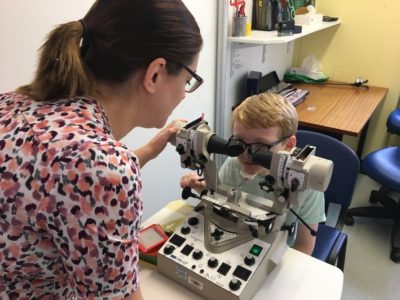The orthoptic departments at Lincoln County Hospital and Pilgrim Hospital, Boston, have just launched a new ‘direct referral service’ which allows health visitors to send young children straight through to the teams for initial assessment and eye care triage.
The new service, being run by United Lincolnshire Hospitals NHS Trust (ULHT), aims to remove unnecessary tests being carried out on the young patients and also reduce the amount of time they spend in hospital if necessary.
Under the pilot scheme, county health visitors can now refer children from as young as six months old up to five years, 11 months, directly into the orthoptic service.
Each assessment should last around 20 minutes and will involve general vision checking, checks for squints or ‘lazy eye’ and whether there’s a need for glasses or any further treatment.
The new process may also remove the need for children to receive dilating eye drops, helping to improve the overall experience for youngsters in the clinic.
Head Orthoptist at Lincoln County Hospital, Helen O’Meara said if successful, the pilot service could be rolled out further to allow GPs to directly refer patients in as well.
“Our new service is all about easy access into the service for parents and children, and picking up any issues with eye health in young children without the need for them to see multiple specialists.
“We currently hold the clinics twice a month and patients are seen very quickly. We accept referrals from any health visitor if there are parental concerns, including issues like lazy eye or if there’s a family history of squint.”
Previously, all children referred into the hospital eye service saw the orthoptist and then a nurse, who administered dilating drops into the eyes, before being seen by the ophthalmologist for further treatment.
This process lasted around two hours and could often be distressing for a young child. The new service means that youngsters should only be in clinic for around 20 minutes – with the possibility of dilating drops no longer being required.
Helen added: “If parents are worried about their child’s eyes, or if someone in the family has had a lazy eye, squint or poor vision in childhood, we encourage them to speak to their health visitor to request a referral to us.”
Bev Sutton, a health visitor at Lincolnshire Community Health Services NHS Trust said the new system is working really well.
“Previously, if we had any concerns regarding a child’s eyes we’d have to refer patients into the full ophthalmology service, now we can get them in and out much quicker and it also helps to reduce any anxieties.
“Picking up these kinds of issues at a young age is crucial, so having an easy access route into the service for children makes the whole process a lot less stressful for both the children and their parents.”
